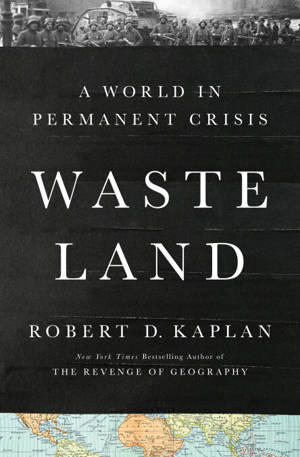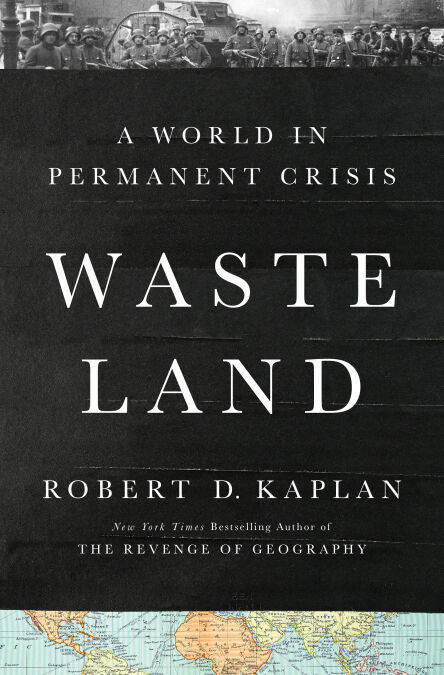
- Retrait gratuit dans votre magasin Club
- 7.000.000 titres dans notre catalogue
- Payer en toute sécurité
- Toujours un magasin près de chez vous
- Retrait gratuit dans votre magasin Club
- 7.000.0000 titres dans notre catalogue
- Payer en toute sécurité
- Toujours un magasin près de chez vous
16,76 €
+ 16 points
Format
Description
An urgent exploration of a world in constant crisis, where every regional disaster threatens to become a global conflict, with lessons from history that can stop the spiral—from the New York Times bestselling author of The Revenge of Geography
“Compelling and helpful . . . Kaplan’s analysis has enormous implications for U.S. strategy abroad. . . . His conclusion is the only right one.”—John Bolton, The Wall Street Journal
One of Financial Times’ Most Important Books to Read This Year • One of Foreign Policy’s Most Anticipated Books of the Year
We are entering a new era of global cataclysm in which the world faces a deadly mix of war, climate change, great power rivalry, rapid technological advancement, the end of both monarchy and empire, and countless other dangers. In Waste Land, Robert D. Kaplan, geopolitical expert and author of more than twenty books on world affairs, incisively explains how we got here and where we are going. Kaplan makes a novel argument that the current geopolitical landscape must be considered alongside contemporary social phenomena such as urbanization and digital news media, grounding his ideas in foundational modern works of philosophy, politics, and literature, including the poem from which the title is borrowed, and celebrating a canon of traditionally conservative thinkers, including Alexander Solzhenitsyn, Jeane Kirkpatrick, and many others.
As in many of his books, Kaplan looks to history and literature to inform the present, drawing particular comparisons between today's challenges and the Weimar Republic, the post-World War I democratic German government that fell to Nazism in the 1930s. Just as in Weimar, which faced myriad crises inextricably bound up with global systems, the singular dilemmas of the twenty-first century—pandemic disease, recession, mass migration, the destabilizing effects of large-scale democracy and great power conflicts, and the intimate bonds created by technology—mean that every disaster in one country has the potential to become a global crisis, too. According to Kaplan, the solutions lie in prioritizing order in governing systems, arguing that stability and historic liberalism rather than mass democracy per se will save global populations from an anarchic future.
Waste Land is a bracing glimpse into a future defined by the connections afforded by technology but with remarkable parallels to the past. Just as it did in Weimar, Kaplan fears the situation may be spiraling out of our control—unless our leaders act first.
“Compelling and helpful . . . Kaplan’s analysis has enormous implications for U.S. strategy abroad. . . . His conclusion is the only right one.”—John Bolton, The Wall Street Journal
One of Financial Times’ Most Important Books to Read This Year • One of Foreign Policy’s Most Anticipated Books of the Year
We are entering a new era of global cataclysm in which the world faces a deadly mix of war, climate change, great power rivalry, rapid technological advancement, the end of both monarchy and empire, and countless other dangers. In Waste Land, Robert D. Kaplan, geopolitical expert and author of more than twenty books on world affairs, incisively explains how we got here and where we are going. Kaplan makes a novel argument that the current geopolitical landscape must be considered alongside contemporary social phenomena such as urbanization and digital news media, grounding his ideas in foundational modern works of philosophy, politics, and literature, including the poem from which the title is borrowed, and celebrating a canon of traditionally conservative thinkers, including Alexander Solzhenitsyn, Jeane Kirkpatrick, and many others.
As in many of his books, Kaplan looks to history and literature to inform the present, drawing particular comparisons between today's challenges and the Weimar Republic, the post-World War I democratic German government that fell to Nazism in the 1930s. Just as in Weimar, which faced myriad crises inextricably bound up with global systems, the singular dilemmas of the twenty-first century—pandemic disease, recession, mass migration, the destabilizing effects of large-scale democracy and great power conflicts, and the intimate bonds created by technology—mean that every disaster in one country has the potential to become a global crisis, too. According to Kaplan, the solutions lie in prioritizing order in governing systems, arguing that stability and historic liberalism rather than mass democracy per se will save global populations from an anarchic future.
Waste Land is a bracing glimpse into a future defined by the connections afforded by technology but with remarkable parallels to the past. Just as it did in Weimar, Kaplan fears the situation may be spiraling out of our control—unless our leaders act first.
Spécifications
Parties prenantes
- Auteur(s) :
- Editeur:
Contenu
- Nombre de pages :
- 224
- Langue:
- Anglais
Caractéristiques
- EAN:
- 9780593730348
- Date de parution :
- 27-01-25
- Format:
- Ebook
- Protection digitale:
- Adobe DRM
- Format numérique:
- ePub

Les avis
Nous publions uniquement les avis qui respectent les conditions requises. Consultez nos conditions pour les avis.






